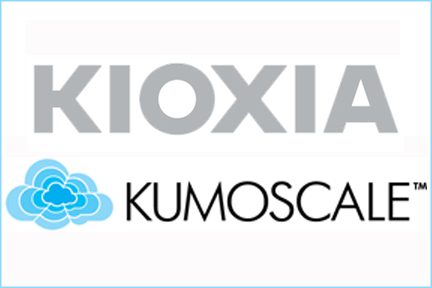The data storage and protection company formerly known as Toshiba Memory America—now called KIOXIA (phonetically kee-oak-she-uh) America—has introduced a new set of functions in its home-built KumoScale storage software.
The new features bring a next-generation networked storage approach to applications managed by the Kubernetes framework while delivering the speed of NVMe flash. KumoScale software can now serve as a container host, providing managed NVMe volumes to storage applications such as distributed file systems and object stores, running locally on KumoScale storage nodes.
Additionally, these new capabilities and applications, along with other KumoScale control-plane services, are deployed and managed via what the company calls a Kubernetes “micro-cluster.” This results in a flexible infrastructure that can serve block, file and object storage simultaneously to Kubernetes, OpenStack and bare-metal clients.
Designed to improve the performance of client, server and storage systems, the NVMe-oF specification is driving new performance levels for cloud and enterprise applications. The company claims KumoScale features integrated with the Kubernetes framework take full advantage of the faster connections offered by NVMe-oF, enabling cloud deployments to serve more users per storage node—and improving operational costs. For example, KIOXIA claims that KumoScale software-enabled storage recently demonstrated 20X faster read and write latencies, and 6X faster IOPS compared with Ceph.
KumoScale feature updates for the Kubernetes framework include:
- The newly released KumoScale CSI Driver supports low-latency core storage functions, data resiliency, snapshots, thin provisioning and live pod migration. KumoScale volumes simply appear to host containers as fast local NVMe drives. The driver is available in the Cloud-native Computing Foundation repository
- The KumoScale Management Cluster manages dozens or hundreds of storage nodes and continuously monitors and manages all of the services required for KumoScale software operation. These control services are containerized, and installed and managed by a private Kubernetes “micro-cluster.”
- Multi-tenant Virtual Clusters servicing multiple compute clusters supporting Kubernetes, OpenStack and/or bare-metal can consume storage concurrently from a single physical KumoScale cluster. The KumoScale provisioner exposes a virtual cluster to each compute cluster, maintaining isolation and storage quotas for each cluster while enabling the storage pool to achieve high resource utilization.
- Third-party Application Hosting for Kubernetes Services enables KumoScale storage nodes to serve as a platform to host container-based storage interfaces, like file and object storage, that can take advantage of native NVMe performance. The KumoScale Management Cluster automatically installs and monitors these additional storage services.
In parallel with the release of these new features, KIOXIA is offering a free two-week trial of KumoScale software, hosted on KIOXIA cloud infrastructure. For more information on how to sign up for the trial visit, go here.
